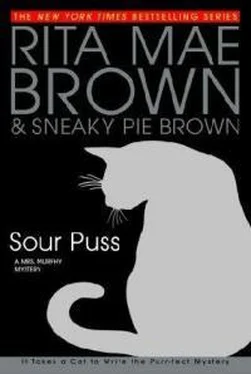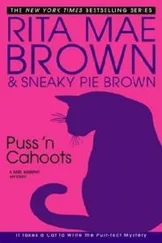Professor Forland smiled indulgently at Toby- "I commend you for remembering after all these years."
Hy Maudant, no fan of the intense Toby, nor the more congenial Arch for that matter, piped up, "Ah, well, I can see you covered a lot of ground in your classes."
"Well, I did, and as you have occasionally asked for my monographs, Mr. Maudant," Professor Forland pointed his finger good-naturedly at Hy, "you know that we study fungi and insects as part of our preparation to go to war for the health of the grape."
"Which brings us back to our original table talk, the health of the grape." Bill genially prodded them, although he, too, was fascinated with this discussion about chemical warfare.
"Before we get back to that, Professor, how many countries have developed chemical warfare using fungus?" Rollie found himself morbidly curious.
"Obviously Iraq , but really they benefitted from the work of the former Soviet Union , work that began in the 1930s. It's reasonable and will someday be proven beyond contest that any client state of the Soviet Union 's had access to the substances, and even to the scientists who produced it. That means that the communist forces inVietnam ,Laos , andCambodia as well as Afghanistan used it on insurgents. It will all come out in the wash, as they say, but the victims remain victims, and the dead remain safely dead."
"What about us?" Fair raised a skeptical eyebrow.
"Meaning?" Rollie was wary of Fair because he was blond and handsome; Rollie was neither.
Arch prudently kept quiet, letting Rollie talk. He glanced once at his old classmate Toby when Toby rolled his eyes. Toby thought Rollie a perfect ass and Arch a fool for going into business with him.
"What have we developed?" Fair replied. "I doubt we've been twiddling our thumbs."
"We are advanced in these matters, but exercising restraint. That's the policy." Professor Forland sounded unconvincing.
"Meaning we haven't sprayed Al-Wherever with mycotoxins?" Fair thought about the animals who suffered for these killing agents and devoutly wished the leaderswho could be so cruel to man and beast vvere sprayed themselves.
"No, we have exercised restraint," Professor Forland repeated.
"I find that hard to believe. It seems that if men have a toy, a weapon, sooner or later they have to use it." Patricia, who had quietly taken all this in, spoke at last.
"History would support your thesis." The professor smiled amiably at his hostess.
"Is there no vaccination against these bioweapons?" Bill asked.
"No vaccination exists against mycotoxins. There is a vaccination for anthrax and for botulism toxin but none for these mycotoxins." Professor Forland reached for wine, the Pinot Gris with a seven percent Riesling, a product of Hy's vineyards. He tasted the liquid, smiling broadly. "Fortunately, our grapes are not used for any such nefarious purposes."
"But couldn't it be done? Couldn't some of the fungi that attack grapes be used for chemical warfare?" Fair wondered.
"Yes. Any fungus could potentially have a lethal application if reduced to its most potent form, but the molds that attack the grain crops are available, the technology has been around for decades. There's no need to besmirch our beautiful grapes, our thriving viticulture, with such a dreadful misuse of our knowledge."
"Having said that, Professor, what is the health of our vines?" Bill was determined to bring them back on course.
"So far so good." The professor held up his glass, nodding his head toward Hy. "Very good, I might add."
"A modest effort." Hy smiled. "I'll be most interested in your opinion," he swept his eyes over the others, soliciting their opinions, too, "of my estate mix—that's what Fiona and I call it." He mentioned his wife, whom he loved deeply without feeling the need to be faithful. "We age it in French oak. It's my baby." He inhaled deeply, then smiled again at Patricia. "You've had success with your Simply Red."
"Cabernet Sauvignon, Merlot, and Cabernet Franc." Bill happily supplied the information.
"We thought about using casks fromHungary but decided against it." Patricia exhaustively researched the different properties of oak, even hickory, from around the world.
Arch listened pensively, then said, "I was down in North Carolina last week visiting an old friend who sticks to Concord grapes"— this made the others smile, since they considered the Concord lowly—"and he swears the sharpshooter is becoming cold-resistant."
"We'll see about that!" Professor Forland's mouth snapped shut at the mention of the insect pest. "That would be like the bubonic plague to grapes." He frowned. "In the thirties, the sharpshooter destroyed the vines of entire states. A very nasty customer."
Toby, happy to contradict Arch, however, said slightingly, "It can't happen. It would have to mutate."
"Or be genetically altered." Professor Forland stared into his wineglass. "That would take a twisted genius."
"Let's not yell before we're bitten, gentlemen." Bill interjected a note of color. "I fear late frosts more than the bugs."
"Indeed," Hy replied.
Patricia lifted the mood. "You know, I was reading the other day about resveratrol, which is an antioxidant that helps prevent heart attacks and cancer, too. Red wine isthe best medicine. Pinot Noir contains 5.01 milligrams per liter. We should market our wines using this information. Think of it as a little medical pizzazz."
"Ah." Hy liked this. "What aboutBeaujolais ?"
"It's got 3.55 milligrams per liter," Patricia quickly replied.
"You read carefully." Professor Forland was impressed. "Cabernet Sauvignon fromChile contains 1.56 milligrams of resveratrol per liter, yet Cabernet Sauvignon fromCalifornia contains only .99 milligrams per liter. The medley—the magic of soil, sun, temperature, elevation, drainage, and the skill of the vintner—can never be quantified."
"But we can taste it," Arch added.
"Indeed." Hy sounded self-satisfied.
"To the vine." The professor toasted them all.
4
"...delivery." Professor Sidney Jenkins finished his remarks concerning bacteriological agents via cattle.
He followed Professor Forland, who listened with great interest. "If I might ask a question before the audience does. You've detailed how bacteria and viruses can be developed in labs and even how they can be delivered. But what do you think are the chances our cattle will be infected?"
Inclining his balding dome, the fortyish Professor Jenkins said, "Highly unlikely. Terrorists can strike more fear and disruption into our system if they aim directly for humans."
Rita Nicolas, former head of the Virginia Angus Association, raised her hand and was recognized. "While I agree, Professor Jenkins, infecting even a few thousand beef cattle would create a negative economic climate for cattlemen immediately."
"Yes, and that is one of their goals—not just to harm cattlemen, but to bleed us dry, if you will." Professor Jenkins nodded.
The audience, standing room only, contained soybean farmers, cattlemen, poultry farmers, and other interested parties. Local doctors and nurses had also turned out in large numbers.
All the large vineyards were represented: Kluge Estate, White Hall Vineyards, Prince Michel Vineyards, Veritas Vineyards, King Family, Mountain Cove, Rockland Vineyards, White Vineyards, Spring Hill, and many others.
Dr. Donald Richardson, a leading breeder of polled Herefords, a gorgeous type of cattle bred without horns, asked, "Are there protocols in place should an outbreak occur in cattle?"
"Yes, Dr. Richardson," Professor Jenkins acknowledged the dermatologist with whom he'd spent many an interesting time at various polled Hereford conferences and auctions, "the problem is, we really won't know how effective they are until we are under siege."
Читать дальше












